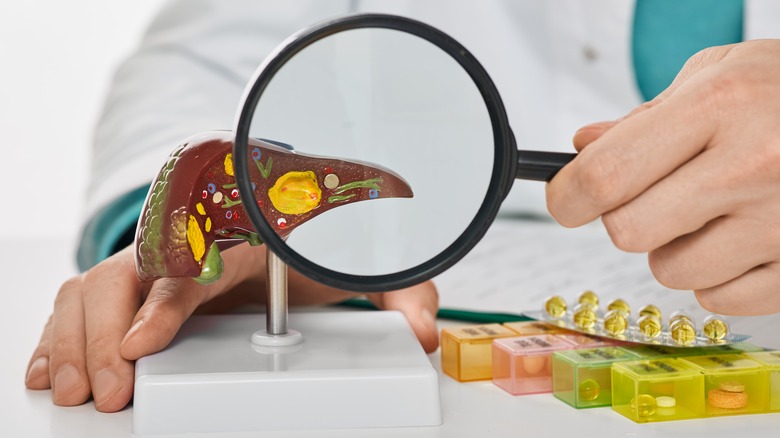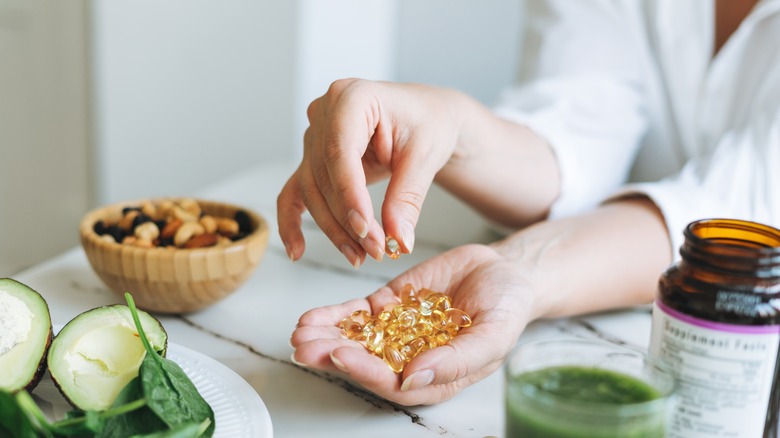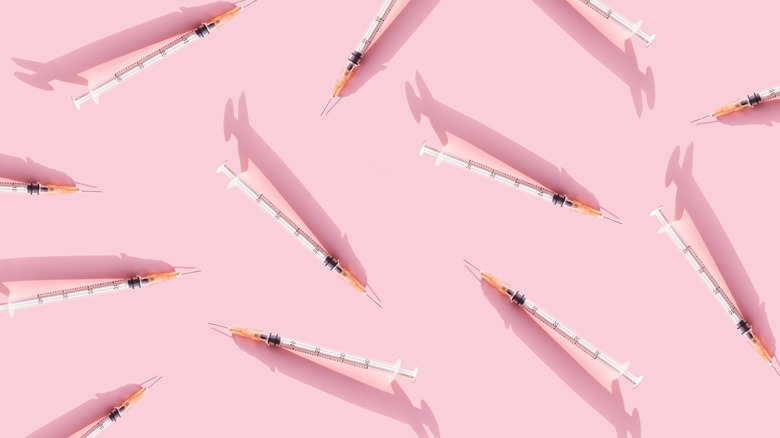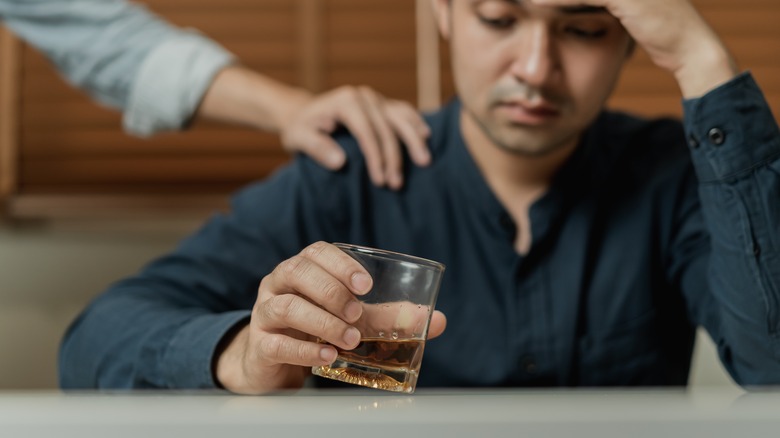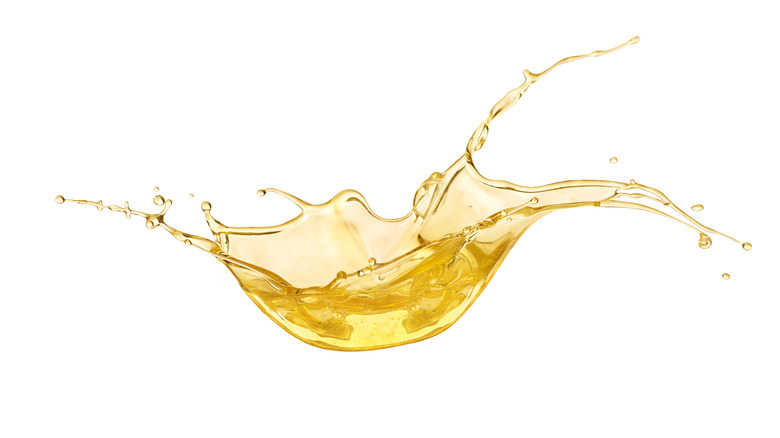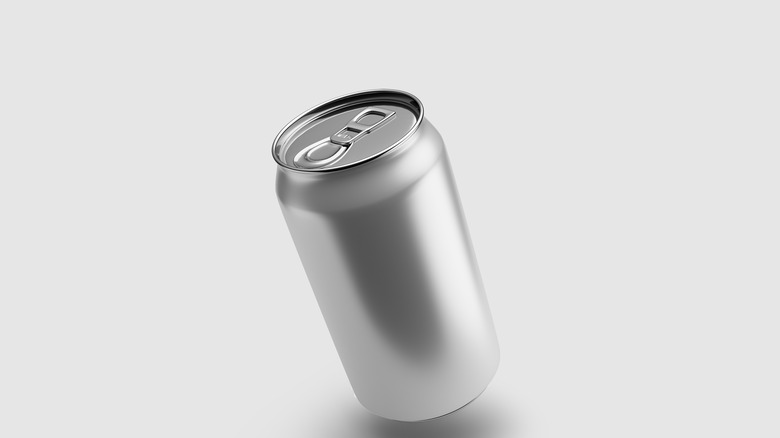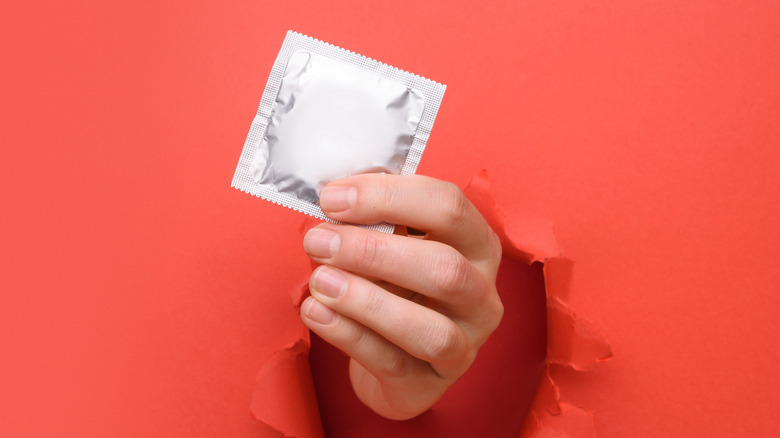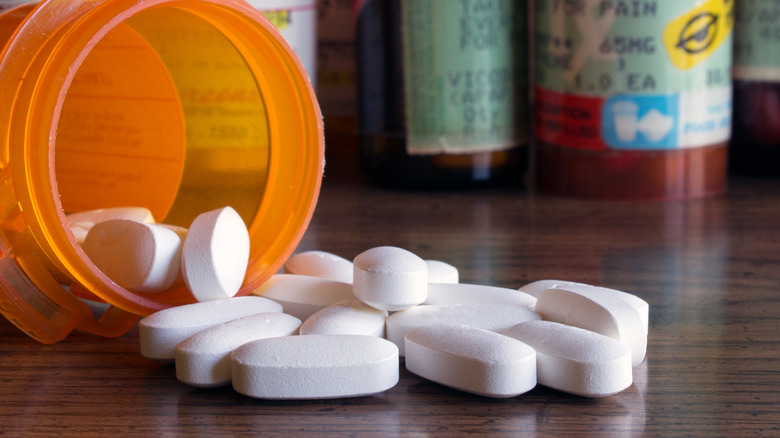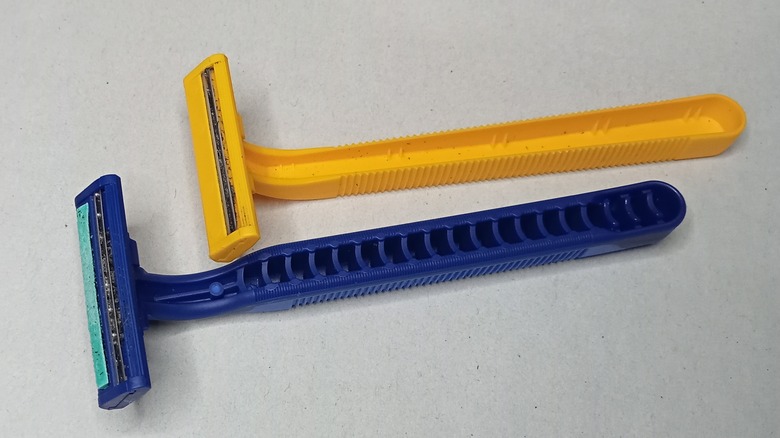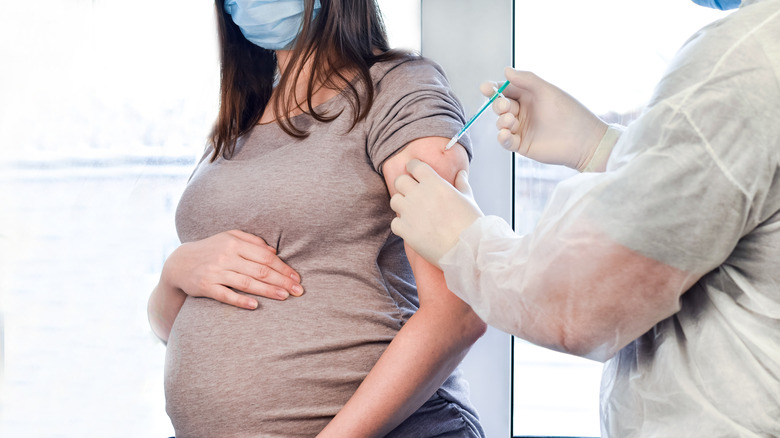14 Things You Didn't Realize Were Hurting Your Liver
The liver is a large and important organ that's susceptible to damage if you're not careful. It's the second-largest organ in the body after your skin, according to the Cleveland Clinic. It's located in your torso, toward the right side of your rib cage, and is roughly the size of a football. Aside from being in charge of segregating waste from nutrients as they pass through the digestive system, it also produces bile, which helps your body digest food while helping to rid your body of toxins.
One in every 10 people in the United States (or about 30 million) has some form of liver disease, based on estimates. Liver disease can mean a number of conditions that cause damage to the liver. Over time, that damage can scar the liver, which is known as cirrhosis. When scar tissue replaces healthy tissue, it prevents the liver from functioning properly. This can eventually lead to liver failure or liver cancer.
Thus, it's important to treat your liver well to prevent damage from occuring. That includes being aware of the different ways you may be accidentally harming this crucial organ.
Exposure to toxins
One of the liver's primary roles in the body is to remove toxins. According to the Hepatitis C Trust, the liver finds and removes toxins from your body through things called sinusoid channels. These channels use immune cells, called Kupffer cells, to filter out toxins as they pass through the liver. Kupffer cells engulf and digest these toxins, then sends them out to be excreted from the body. If the toxins aren't excreted they can be stored inside fat cells inside the liver, although this is potentially harmful for the liver.
The liver can typically process toxins well, but too much can cause damage, explains Johns Hopkins Medicine. It's important that you limit the amount of toxins you put into your body, to make sure you don't overload the liver. Washing your fruits and vegetables before you eat them can lower the amount of toxins you ingest because it removes pesticides from their skin. There are also some household cleaning products that can be dangerous, so make sure you read their labels and use them properly.
Harmful supplements
Regulations in the supplement industry aren't as tight as you might think. The Food and Drug Administration (FDA) regulates the supplement industry, but they warn that supplement companies don't need prior approval before they can sell their products. For that reason, you have to be careful when you're taking a supplement, because there's no guarantee that it's safe.
Johns Hopkins Medicine says that supplements with the word "natural" on their labels can still be dangerous. Some herbs and supplements have been linked to liver damage. A study published in the International Journal of Molecular Sciences suggests that the number of cases of liver damage from supplements is probably underreported, since many people assume that the industry is regulated. The researchers list certain supplement brands that have been linked to liver damage in the past, as well as ingredients like green tea extract and linoleic acid, which could cause liver damage. The scientists also recommend that the supplement industry be more tightly regulated to prevent these potentially dangerous products from inflicting liver damage and causing other health problems.
Using illegal drugs
Taking illegal drugs can be dangerous for a number of reasons. You could face legal problems for taking them, and since they're not regulated, there could be ingredients in the drugs that you don't expect. Some illegal substances are known to cause liver damage, among other health problems. For example, according to Banyan Treatment Centers, heroin can cause liver damage. The liver's job is to detoxify the bloodstream by removing the drug.
The liver is good at its job, but using drugs like heroin chronically makes the liver work extremely hard. That can lead to liver damage over time and weaken it so that it has a hard time managing other toxins. Other illegal drugs that can cause problems include cocaine and methamphetamine. Cocaine affects your liver enzymes, and can cause inflammation of the liver or rhabdomyolysis, which is a wasting of the muscle tissue. Methamphetamine, on the other hand, can cause liver damage by raising your body temperature and increasing blood pressure. It also depletes a compound called glutathione, which helps your liver break down toxins.
Ignoring warning sings of liver problems
If you suspect that something is going wrong with your liver, it's best to see a healthcare professional as quickly as you can. The tricky thing about liver problems is that they can be very difficult to spot, according to the American Liver Foundation. Many people don't develop obvious symptoms until they have a serious problem. However, detecting liver disease early is the best way to prevent serious damage.
One of the things that makes the liver so incredible is that it can actually heal itself, even if you have scar tissue from previous damage. That's why catching liver problems early can save you. Unfortunately, many people don't realize they have a liver problem until it becomes serious, since many liver issues don't have very noticeable symptoms.
Eventually, with enough damage, you can develop liver failure or liver cancer, both of which are extremely serious. Your doctor can help you determine if you have liver damage by performing a blood test, imaging tests, or in some cases a biopsy of the liver.
Excessive alcohol consumption
Even though it's a legal substance, alcohol can be very damaging to the liver. According to the Physician's Committee for Responsible Medicine (PCRM), alcohol is the most abused drug in the world. Excessive alcohol use can come in the form of binge drinking, which is a lot of alcohol consumed at once, or drinking a moderate amount over time. The PCRM notes that alcohol intake of over 30 grams per day, which is a little more than 2 drinks, is linked to cirrhosis of the liver.
Of all the organs in the body, the liver takes the most damage from alcohol consumption, says a study published in Alcohol Research. That's because alcohol is mostly metabolized in the liver. Some of the possible liver problems that alcohol can cause include fatty liver, cirrhosis of the liver, and hepatitis. However, the researchers write that only about 35% of people with drinking problems end up with serious liver disease. There are a number of factors that play a role in whether or not you'll have severe liver problems, such as age, gender, taking illegal drugs, and exposure to hepatitis viruses.
Eating the wrong kinds of fats
There are different types of fats in the food you eat, and some are healthier than others for your liver. The National Institute of Diabetes and Digestive and Kidney Diseases (NIDDK) suggests making some changes to the types of fat you eat if you've been diagnosed with nonalcoholic fatty liver disease. Nonalcoholic fatty liver disease occurs when excess fat builds up in the liver. Normal, healthy livers contain some fat, according to the Liver Foundation. Fat buildup is only considered a problem if more than 5% to 10% of the liver is made up of fat.
A paper published in Frontiers in Nutrition explains that eating too many calories contributes to the development of fatty liver disease. However, the food you eat also matters. The authors identify saturated fat as one of the contributors to fatty liver disease. Eating less of this type of fat, which is usually found in animal sources such as butter, other fatty dairy products, fatty meat, and coconut oil, can help prevent nonalcoholic fatty liver disease. The researchers found that unsaturated fat, which is usually found in vegetable oils, fish oils, and nuts, is actually protective of the liver. You can replace saturated fat in your diet with unsaturated fat to improve liver health.
Eating too much sugar
In addition to switching the type of fat you eat, consuming less sugar and better sources of carbohydrates can be helpful to prevent and treat nonalcoholic fatty liver disease. The National Institute of Diabetes and Digestive and Kidney Diseases (NIDDK) explains that you should avoid sugary drinks such as sweetened soft drinks, sports drinks, sweetened tea, and juices.
It's wise to avoid fructose in particular. Fructose is a form of sugar most commonly found in fruit and honey. To find healthy sources of carbohydrates, look for low-glycemic index food. Most fruits, vegetables, and whole grains fit into this category. These types of foods have less of an impact on your blood sugar levels than simpler sources of carbohydrates, such as white bread, white rice, and potatoes.
Lowering your overall carbohydrate intake can also help, according to a study published in Hepatobiliary Surgery and Nutrition. The authors explain that liver fat can accumulate from eating too many carbs. Low-carb diets have been shown to reduce the amount of triglycerides found in the liver.
Having unprotected sex
There are certain diseases that can spread when you have unprotected sex that can seriously damage the liver. According to the American Liver Foundation, risky sex practices such as not wearing a condom or having multiple partners can increase your risk for contracting hepatitis B. Practicing safe sex or abstaining from sex, can dramatically decrease your risk.
Hepatitis B can travel from an infected person to a non-infected person through bodily fluids such as semen, explains the Centers for Disease Control and Prevention (CDC). If you get infected with this virus, you might not show symptoms at first. It can be a short-term illness, but it can also turn into a serious issue and cause liver damage or liver failure.
While sexual contact is one of the most common ways for hepatitis B to spread, it can also pass from a mother to child at birth. In children who have the virus, roughly 90% suffer chronic infection. On the other hand, roughly 2% to 6% of people who get the virus as adults will have long-term and recurring infections.
Taking acetaminophen improperly
If you have a fever or aches, or even just muscle soreness from a tough workout, you might reach for a bottle of over-the-counter pain relievers. One common active ingredient in pain relievers is acetaminophen, which reduces pain and can relieve fevers, among other things, according to MedlinePlus. Taking too much acetaminophen, taking it improperly, or mixing it with the wrong medication can cause liver damage, says Cedars-Sinai.
Provided you take acetaminophen properly, you shouldn't experience liver problems. However, MedlinePlus warns that taking too much can cause liver damage so severe that it can require a liver transplant. Try not to take more than one medication that contains acetaminophen at a time, and follow the dosing instructions on the bottle. You shouldn't take over 4000 milligrams of acetaminophen per day. You should also avoid acetaminophen if you have three or more drinks per day. Your doctor can help you figure out how to safely drink alcohol while on the drug.
Contaminated food and drink
One form of the hepatitis virus, hepatitis E, is more common amongst travelers, according to the CDC. If you're in an area without clean drinking water or food safety standards, you could be at an increased risk for catching the virus. Unfortunately, there's no vaccine, so you have to be vigilant. If you catch hepatitis E, you might not develop symptoms at all. However, it can damage the liver over time.
People who already have liver disease are at an increased risk for serious illness if they catch hepatitis E. However, most healthy people who are infected with hepatitis E recover. If you develop symptoms, you might have nausea, fever, loss of appetite, stomach pain, and joint pain. Your symptoms can last two to six months. To avoid catching hepatitis E, don't have drinks with ice in them, unless the ice is made from bottled or treated water. Try to only drink liquids that have been packaged and sealed. If you have milk, make sure it's pasteurized milk, and eat food that's been cooked.
Failing to maintain a healthy body weight
In general, living a healthy lifestyle can keep your liver from getting damaged. Harvard Health mentions that a healthy body weight can help prevent liver disease. They also mention that healthy lifestyle choices, such as proper nutrition and regular exercise, help prevent liver problems. Living a healthy lifestyle can also help prevent people who already have liver disease from developing even more serious problems.
A study published in Scientific Reports found that weight loss was helpful for people with nonalcoholic fatty liver disease, but there are significant challenges. The problem, explain the authors, is that a lot of people who lose weight eventually gain it back. However, the researchers determined that it didn't matter if someone regained then lost weight again. Fluctuations in weight weren't associated with nonalcoholic fatty liver disease, but body weight was. That means it might be difficult to lose weight, but even if it fluctuates up and down, any amount of total weight loss can help with the disease.
Not exercising enough
When it comes to preventing and treating liver disease, Harvard Health recommends getting physically active. In general, exercise is good for your health. The Department of Health and Human Services provides a rough outline for the amount of physical activity most adults should have. Aim to do roughly 150 to 300 minutes of physical activity per week. That can include walking, jogging, swimming, cycling, or other aerobic activity. You should also aim for two weight training session per week, working all major muscle groups in the body each time.
A study published in Gene Expression explains the importance of exercise for liver health. According to the authors, exercise reduces the amount of fat in your liver. It does so by making the insulin in your body more effective, metabolizing fatty acids in the liver, and improving the function of mitochondria in the liver. The researchers also noted that people with fatty liver disease were healthier with exercise, even if they didn't lose weight simultaneously. That shows how important exercise can be in the prevention and treatment of nonalcoholic fatty liver disease.
Sharing personal items that have blood on them
A few variations of the hepatitis virus spread through blood. Winchester Hospital recommends that you don't share anything that could have blood on it. For example, sharing your toothbrush or even a razor blade can cause the transfer of hepatitis. Avoid injecting any drugs that aren't prescribed by your doctor, as needles can also carry the virus. Even piercings and manicuring tools can transfer the virus.
Hepatitis C is one type of hepatitis that's primarily transferred through the sharing of needles, according to the CDC. While hepatitis C is often a short-term illness, roughly half of the people that contract it suffer from it chronically. This long-term illness can cause cirrhosis of the liver and liver cancer. Similar to hepatitis E, there's no vaccine for hepatitis C, which means that the best way to prevent infection is avoiding contact with someone else's blood.
Neglecting to get hepatitis vaccines
The hepatitis virus comes in a few forms, all of which can be damaging for your liver. While not all forms of the virus have a vaccine, most do. Winchester Hospitals recommends getting your hepatitis A and hepatitis B vaccines to prevent infection. According to the Pan-American Health Oranization (PAHO), both vaccines have high efficacy rates and are safe.
The hepatitis B vaccine is between 95% and 100% effective, says the PAHO. It prevents liver damage and liver cancer that can occur as a result of infection. Hepatitis A vaccines are similarly effective, with nearly 100% of people developing an immunity to the virus within a year of their first shot. There's also an option in some places to get a joint hepatitis A and B vaccine. Some countries use one dose of the hepatitis A vaccine, while others recommend getting two doses for full protection.
The hepatitis B vaccine is recommended for most children, according to the Children's Hospital of Philadelphia. First doses of the vaccine can be given as early as 24 hours after birth, with two more doses recommended before 18 months of age. However, teenagers and adults can receive the vaccine if they weren't given one during childhood.

